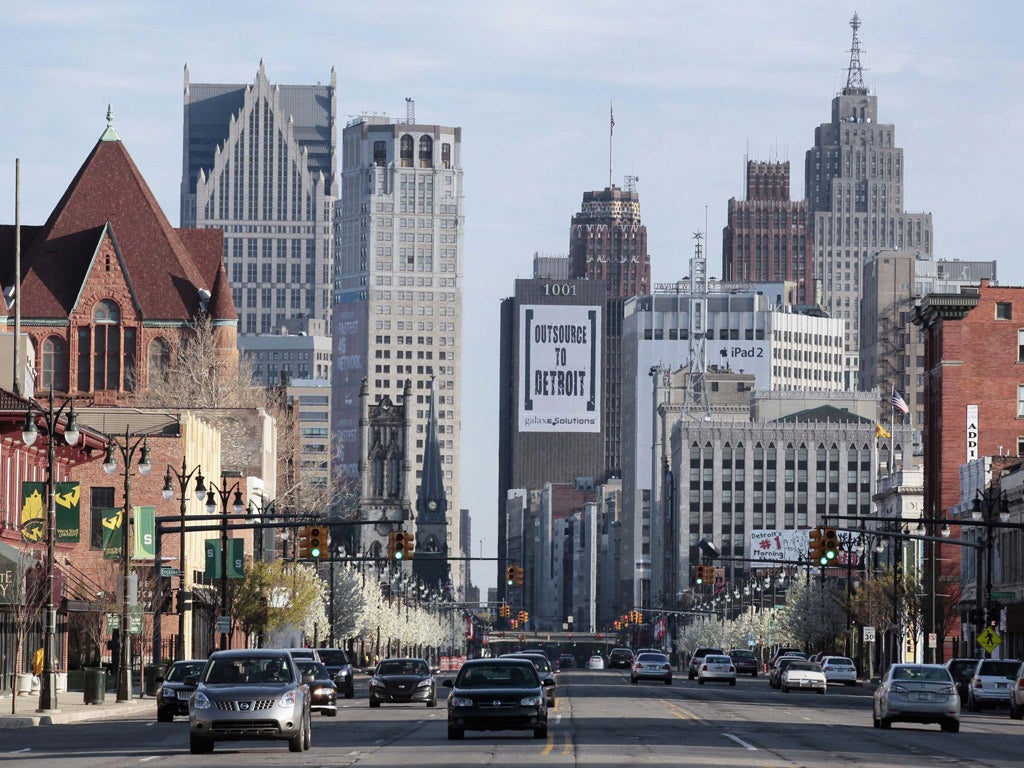
The humiliation of once-proud Detroit, cradle of the American automobile industry and of the sound that became known simply as Motown, seems to know no end as the city has reluctantly and angrily agreed for the first time to share control of its future destiny with the penny-pinchers from far-away Lansing, the state capital.
After weeks of debate so emotional and tumultuous that Mayor David Bing was twice admitted to hospital - where he remained yesterday - a divided City Council voted 5-to-4 late on Wednesday to accede to the formation of a new supervising committee to help drag the raggedy metropolis out of a financial hole, the depths of which feature a budget deficit of $200 million and $13.2 billion in long-term debt.
While many in the city have greeted the partial surrender of its autonomy with dismay, it could have been worse. The Council acted hours before a deadline set by Michigan Governor Rick Snyder, who was otherwise ready to impose an emergency manager on the city that would have stripped the Council and the mayor of almost all their powers.
“It’s a clear message that we will move forward - and win - as one Michigan,” Mr Snyder said after the vote was finally taken. “We all want Detroit to succeed.”
While the rest of Michigan is starting to see economic gains, particularly with the return to profit of the ‘Big Three’ car makers, its most famous city, once home to two million people, can’t catch a break.
Successive attempts to revive it, including the building of two large casino complexes near downtown, have faltered in the face of the wider exodus of its residents. From 2000 to 2010 alone its population shrank by 25 per cent and now it stands at just over 700,000.
It is a crisis compounded by the foreclosure disaster that started with bad loans to home owners and is now nearly five years old. “Detroit is like ground zero for all the devastation created by these terrible loans,” said Ira Rheingold of the National Association of Consumer Advocates.
Lenders have foreclosed on no fewer than 28,000 homes in Detroit since 2007, which has helped contribute to a city landscape crowded with abandoned and crumbling houses. After accepting that downsizing of the city’s infrastructure was his only option Mayor Bing ordered in 2010 the razing of 10,000 homes. He is about half way through while the city has identified another 26,000 homes that will probably also have to be demolished.
That the city will no longer be the sole master of its own destiny is especially alarming to union leaders pledged to protecting those municipal workers who keep what remains of it running. It is a given that when it is formed, the new supervising commission will move first to cut municipal salaries and jobs.
“All it’s going to be is more exploitation of the citizens,” John Riehl of the American Federation of State, County and Municipal Employees said of the deal. “I think they’re trying to turn the unions into nothing but punching bags for the city’s problems.”
Brewing near the surface also are ethnic and party political suspicions. Detroit is 80 per cent African American and heavily Democrat, while the governor and state legislature are Republican. Some see the agreement as surrendering Detroit to a Republican – and white – hostile takeover.
Still, most in Detroit seemed to have concluded that a limited power-share deal with the Governor, called a consent agreement, was inevitable and perhaps will be for the long-term good.
“Nobody should minimize the uneasiness - to put it in the mildest term - Detroiters may feel as their elected leaders enter into a financial consent agreement with the state. It is a very difficult situation,” the Detroit Free Press said in an editorial. “But Wednesday night's 5-4 City Council vote to bring about this situation should not have been such a close call. A consent agreement - and this one in particular - is by far the least worst way to save the city.”
Subscribe to Independent Premium to bookmark this article
Want to bookmark your favourite articles and stories to read or reference later? Start your Independent Premium subscription today.

Join our commenting forum
Join thought-provoking conversations, follow other Independent readers and see their replies